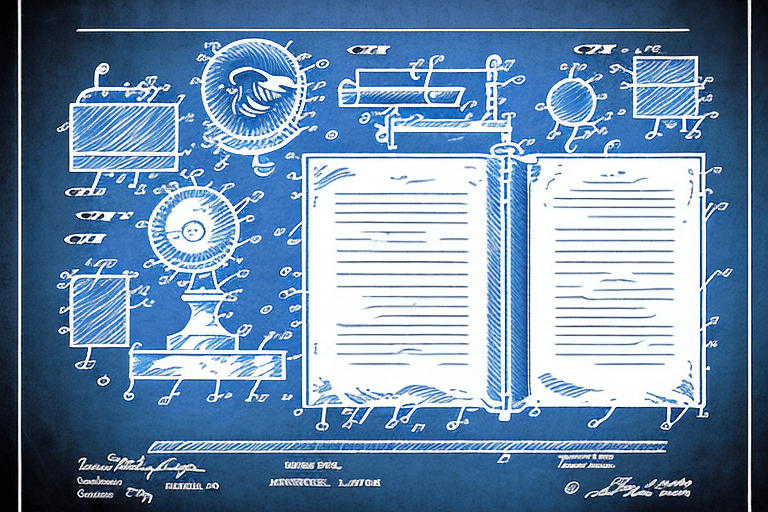Taking the USPTO Patent Bar Exam is a significant milestone for anyone aspiring to become a patent attorney. The exam assesses an individual’s knowledge and understanding of patent law and procedures, ensuring they are qualified to practice before the United States Patent and Trademark Office (USPTO). Before diving into the preparation process, it is crucial to assess your readiness for this challenging exam.
Understanding the USPTO Patent Bar Exam
The USPTO Patent Bar Exam is a comprehensive assessment that tests applicants on various aspects of patent law. It evaluates their understanding of patentability requirements, patent prosecution procedures, and ethics rules applicable to patent practitioners.
Patent law is a complex and specialized field that requires in-depth knowledge and expertise. The USPTO Patent Bar Exam serves as a benchmark to ensure that individuals seeking to practice patent law have the necessary skills and understanding to effectively navigate the intricacies of this legal domain.
By passing the USPTO Patent Bar Exam, applicants demonstrate their proficiency in interpreting and applying patent laws and regulations. This exam is designed to assess their ability to analyze technical and legal information, identify relevant patentability criteria, and effectively communicate their findings.
Overview of the USPTO Patent Bar Exam
The USPTO Patent Bar Exam consists of two main sections: the Patent Bar Examination and the Ethics Exam. Each section evaluates different aspects of an applicant’s knowledge and understanding of patent law.
The Patent Bar Examination focuses on technical and legal aspects of patent law. It assesses an applicant’s ability to interpret patent claims, analyze prior art, and determine the patentability of inventions. This section covers a wide range of topics, including patent searching, patent application drafting, and patent prosecution procedures.
The Ethics Exam, on the other hand, ensures that applicants are familiar with the ethical rules and responsibilities associated with practicing patent law. It examines their understanding of the USPTO’s Rules of Professional Conduct and their ability to identify and address potential ethical issues that may arise in the course of patent practice.
Both sections of the exam are equally important and require thorough preparation and study to achieve a passing score. Applicants must demonstrate not only their technical and legal knowledge but also their ethical awareness and commitment to upholding the highest standards of professional conduct in the field of patent law.
Importance of the USPTO Patent Bar Exam
Passing the USPTO Patent Bar Exam is a prerequisite for becoming a registered patent attorney or agent. It provides legal authority to draft and prosecute patent applications before the USPTO, which is essential for individuals wishing to pursue a career in patent law.
Becoming a registered patent attorney or agent opens up numerous career opportunities in the field of intellectual property law. These professionals play a crucial role in helping inventors and businesses protect their innovations and navigate the complex patent system.
Being registered with the USPTO also allows patent attorneys and agents to represent clients in patent litigation proceedings and engage in other legal activities related to patents. This recognition by the USPTO enhances their credibility and reputation as trusted advisors in the field of patent law.
Furthermore, passing the USPTO Patent Bar Exam demonstrates a commitment to professional development and continuous learning. Patent law is a constantly evolving field, with new laws, regulations, and court decisions shaping its landscape. By successfully completing the exam, individuals show their dedication to staying abreast of the latest developments and maintaining a high level of competence in patent law.
In conclusion, the USPTO Patent Bar Exam is a rigorous assessment that evaluates applicants’ knowledge and understanding of patent law. By passing this exam, individuals gain the legal authority to practice patent law and open doors to exciting career opportunities in the field of intellectual property.
Evaluating Your Current Knowledge and Skills
Before delving into exam preparation, it is vital to assess your current knowledge and skills in patent law. Identifying your strengths and weaknesses will help you create an effective study plan tailored to your specific needs.
When evaluating your current knowledge and skills in patent law, it is important to consider various factors. One of these factors is your educational background. Reflect on the courses you have taken in the past that are related to patent law. Did you study any intellectual property law subjects during your law school or undergraduate studies? If so, these courses may have provided you with a solid foundation of knowledge that you can build upon.
Another aspect to consider is your work experience. Have you worked in a legal field that involves patent law? Perhaps you have had the opportunity to handle patent-related cases or assist patent attorneys in your previous job. This practical experience can give you valuable insights and a deeper understanding of patent law concepts.
In addition to your educational background and work experience, it is crucial to reflect on any prior exposure you may have had to patent law. Have you attended seminars, workshops, or conferences on patent law? Have you read books or articles on the subject? These experiences can contribute to your overall familiarity with the topic and may have already equipped you with some foundational knowledge.
Identifying Your Strengths
Consider your educational background, work experience, and any prior exposure to patent law. Recognize areas where you feel confident and knowledgeable, as these will help form a solid foundation for exam preparation.
Once you have evaluated your educational background, work experience, and prior exposure to patent law, you can identify your strengths in the subject. These strengths may manifest in your ability to understand complex legal concepts, analyze patent claims, or interpret case law effectively. Acknowledging these areas of expertise will boost your confidence and provide a starting point for your exam preparation.
Furthermore, your strengths may extend beyond the technical aspects of patent law. For example, if you have excellent research skills or are adept at legal writing, these skills can be advantageous during the exam. Identifying these additional strengths will help you leverage them to your advantage and enhance your overall performance.
Recognizing Your Weaknesses
Take an honest and objective look at areas where your knowledge may be lacking or less extensive. Identifying weaknesses will allow you to prioritize those topics during your study plan and dedicate additional time and effort to mastering them.
While assessing your current knowledge and skills, it is essential to recognize any weaknesses you may have in patent law. These weaknesses could arise from gaps in your educational background, limited work experience in patent law, or a lack of exposure to specific patent law topics. Identifying these areas of weakness is crucial as it will guide your study plan and enable you to allocate more time and effort to mastering these challenging concepts.
Moreover, understanding your weaknesses can help you seek additional resources or assistance in those specific areas. Whether it’s consulting with a patent law expert, joining study groups, or accessing online tutorials, addressing your weaknesses head-on will ultimately strengthen your overall understanding of patent law.
Preparing for the USPTO Patent Bar Exam
Preparing for the USPTO Patent Bar Exam requires careful planning and a systematic approach. Several steps can help you effectively navigate through the study material and maximize your chances of success.
When embarking on this journey, it is important to understand the significance of the USPTO Patent Bar Exam. This exam is a crucial step towards becoming a registered patent attorney or agent, allowing you to practice before the United States Patent and Trademark Office. As such, thorough preparation is essential to ensure a solid foundation of knowledge and increase your chances of passing.
Study Materials and Resources
Acquiring the appropriate study materials and resources is essential for a comprehensive preparation strategy. These may include study guides, practice exams, textbook resources, online courses, and relevant patent law publications. Utilize a combination of these resources to gain a thorough understanding of the exam content.
Study guides can provide a structured approach to learning the complex concepts and principles of patent law. They often break down the material into manageable sections, making it easier to digest and comprehend. Practice exams, on the other hand, allow you to assess your knowledge and identify areas that require further attention. By simulating the actual exam experience, you can familiarize yourself with the format and time constraints, helping to reduce anxiety on the day of the test.
Textbook resources and online courses offer in-depth explanations and examples, providing a more comprehensive understanding of patent law. These resources may delve into case studies, real-life scenarios, and historical context, enabling you to grasp the intricacies of the field. Additionally, staying up-to-date with relevant patent law publications is crucial, as it ensures you are aware of any recent changes or developments in the industry.
Creating a Study Schedule
Organize your study time by creating a realistic and disciplined study schedule. Set aside dedicated blocks of time each day or week to review the material, take practice exams, and reinforce your understanding of patent law concepts. Establishing a routine will help maintain consistency and ensure steady progress.
When creating your study schedule, consider your personal preferences and learning style. Some individuals may prefer studying in shorter, focused sessions, while others may thrive with longer study periods. Experiment with different approaches to find what works best for you. Additionally, it is important to allocate time for breaks and relaxation to avoid burnout and maintain mental clarity.
Furthermore, consider incorporating different study techniques into your schedule. For example, you can dedicate certain days to reading and summarizing study guides, while others can be focused on solving practice questions and reviewing your answers. By diversifying your study methods, you engage different parts of your brain and enhance knowledge retention.
Lastly, remember to set realistic goals and milestones within your study schedule. Breaking down the material into smaller, manageable chunks will not only make it less overwhelming but also provide a sense of accomplishment as you progress through your study plan.
Taking Practice Exams
Practice exams play a crucial role in preparing for the USPTO Patent Bar Exam. They allow you to familiarize yourself with the exam format, assess your knowledge and performance, and identify areas that require further attention.
Benefits of Practice Exams
Practice exams simulate the actual exam experience and help build your confidence under the time constraints. They provide a practical assessment of your understanding of patent law concepts and your ability to apply them in a test-like setting.
Analyzing Your Practice Exam Results
After completing each practice exam, carefully analyze your results and identify areas where you excelled and areas where you struggled. Use this information to adjust your study plan and focus on strengthening your weaker areas.
Seeking Additional Support
Preparing for the USPTO Patent Bar Exam can be challenging, and seeking additional support can greatly enhance your chances of success. Exploring various avenues for assistance can provide valuable insights and guidance.
Finding a Study Group or Tutor
Joining a study group or working with a tutor can provide a collaborative learning environment. Engaging with peers and experienced individuals in the field can offer new perspectives, clarify complex topics, and help solidify your understanding of patent law.
Utilizing Online Forums and Communities
Online forums and communities dedicated to the USPTO Patent Bar Exam can be valuable resources for information sharing and support. Interacting with fellow exam takers, asking questions, and participating in discussions can provide additional clarity and boost your confidence.
Conclusion
Passing the USPTO Patent Bar Exam is a significant accomplishment that opens doors to a rewarding career in patent law. By assessing your readiness, preparing diligently, and seeking support when needed, you can enhance your chances of success in this critical examination. Remember, the journey to becoming a registered patent attorney begins with a well-prepared and confident approach to the USPTO Patent Bar Exam.











